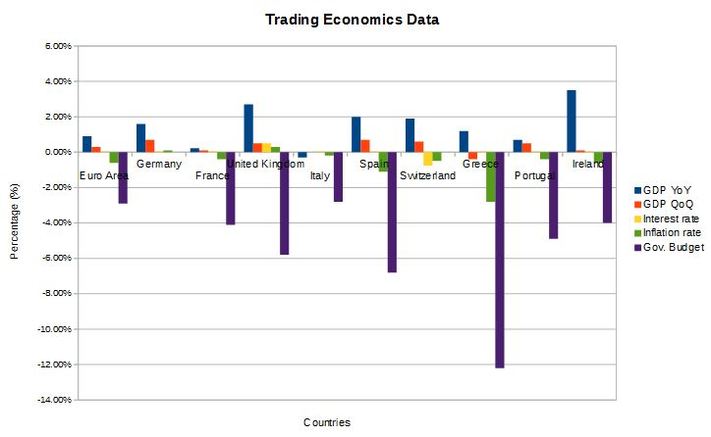In an effort to bring the budget deficits of EU member countries down to a sustainable level, the European Commission has recently been placing significant pressure on France to reduce its deficit to a level of 4 percent by the end of 2015. Ultimately, the goal is for France to reach a budget deficit of 2.8 percent by the end of 2017, which would bring the country below the generally accepted EU restriction of 3 percent of overall Gross Domestic Product.
Indeed, France has taken measures to attempt to bring down its budget deficit. However, where the EU and France differ is the pace at which this should be achieved. For instance, Paris has set out slightly different guidelines than that being imposed by the EU, with a target of reducing the budget deficit to 4.1 percent of GDP this year, and further down to a level of 3.6 percent in 2016 (in contrast to the level of 3.4 percent set by Europe). In their own words, the European Commission has set the following guidelines for France (the full council recommendation can be read here):
1) “France should put an end to the present excessive deficit situation by 2017 at the latest”.
2) “France should reach a headline deficit of 4.0 % of GDP in 2015, 3.4 % of GDP in
2016 and 2.8 % of GDP in 2017, which is consistent with delivering an improvement
in the structural balance of 0.5 % of GDP in 2015, 0.8 % of GDP in 2016 and 0.9%
of GDP in 2017. This would require additional measures of 0.2 % of GDP in 2015,
1.2 % of GDP in 2016 and 1.3% of GDP in 2017 based on the extended Commission
2015 winter forecast”.
3) “France should fully implement the already adopted measures for 2015 and ensure, by
end April 2015, an additional fiscal effort as stipulated in paragraph (2). This would
require the specification, adoption and implementation of additional structural
discretionary measures equivalent to 0.2% of GDP to close the gap with the
recommended improvement in the structural balance of 0.5 % of GDP for 2015”.
This particular situation is quite notable, as we have seen that up till recently it was peripheral nations such as Greece, Ireland, and Portugal among others that were under persistent pressure to reduce their share of budget deficits. So, how will such austerity measures impact France going forward? In answering this question, it helps to put the economic performance of France in context with the rest of its European peers:
Source: Trading Economics
From the above bar chart, there are a few interesting insights. First, the budget deficits of countries such as Greece, Portugal and Spain are significantly higher than that of France. In addition, we can also see that year-on-year GDP growth in those countries is quite high in comparison to France – in fact we can see that France has the second lowest rate of GDP growth behind Italy.
Additionally, France, along with several other countries in the Eurozone has slipped into deflation. In this regard, I am concerned that the Eurozone may be overly targeting France in attempting to reduce the Eurozone deficit as a whole. France, along with Germany is one of the largest economies in Europe and a higher rate of cuts in government spending along with tax increases could lead to a worsening of what is already a lower rate of GDP growth in France. Deflationary trends across the Eurozone have already hampered growth across the continent, and a slowdown in growth by one of Europe's largest economies could have greater ramifications for the wider European Economic Area.
For instance, we can see that Greece has a higher rate of GDP growth than that of France – yet it has been agreed that the bailout terms for Greece will be extended by a further four months, with the EU Commission claiming Greece's plan to be “sufficiently comprehensive”. Note that I do not disagree with such a decision by Europe per se; markets have reacted positively to this news as Greece has reaffirmed its commitments to austerity in response to the extension. However, I am concerned that Europe may be prioritizing growth in peripheral areas over that of larger economies like France. Should this be the case, then an economic slowdown in France will negatively impact both core and peripheral European economies alike.
To conclude, economic growth in France has remained quite low compared to that of the wider euro area and several peripheral countries. While the European Commission has set clear targets for France to reduce its budget deficit, this must be done in a careful manner to ensure that GDP growth and deflation does not fall further – a slowdown in France could mean bad news for wider Eurozone growth.
Original post
